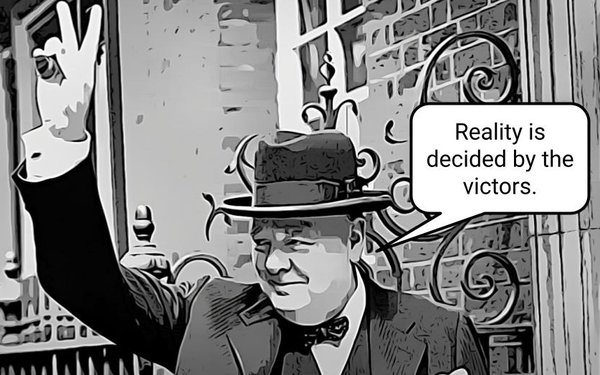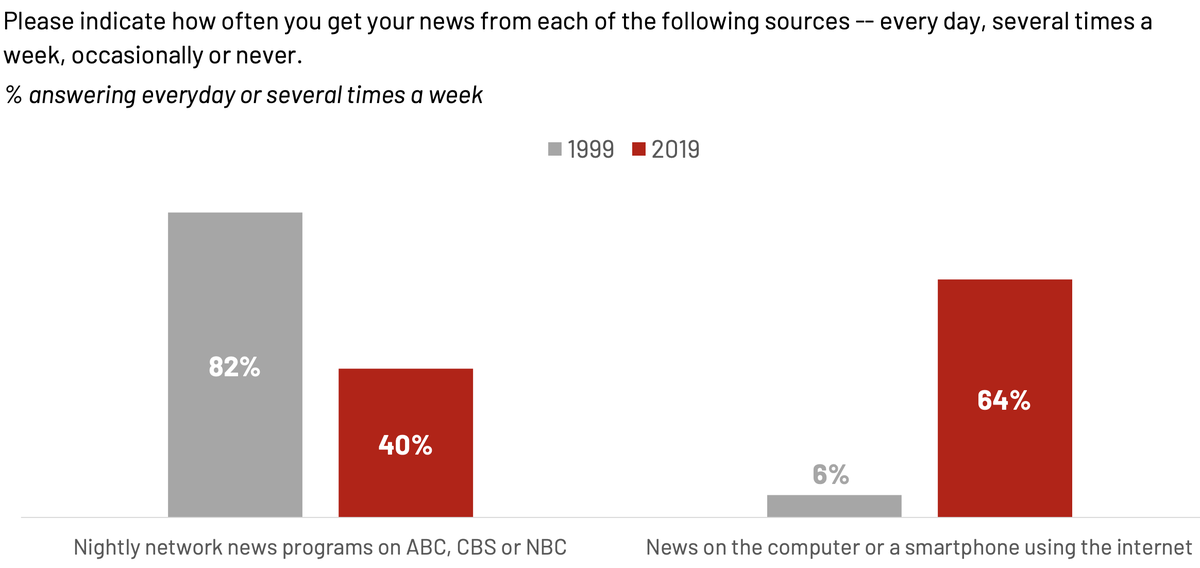
They say history is written by the victors.
But in today’s world of hyper-fragmented, always-on, increasingly synthetic and easily manipulatable real-time media, the phrase should be updated to:
Reality is
decided by the victors.
Historical truth has become increasingly ephemeral the more we rely on information coming from newsfeeds and media housed in bits, and less from the kind preserved
in libraries, academia, courts and archives preserving some of our most foundational principles.
I mean, how else can you explain history repeating itself with the rise of fascism in America
and the shift to autocracy not just here, but around the world.
Am I the only one who finds it ironic that I'm writing this on Veterans Day less than a century after some of our greatest
defeated dictators attempting to conquer the world, ushering in the greatest expansion of democracy and freedom the world has ever seen?
advertisement
advertisement
I've published my analysis correlating the rise of the internet and the decline of democracy worldwide many times,
so I won't repeat it here, but it's worth keeping in mind less than a week after democracy lost a crucial battle in the info war being fought on U.S. soil.
So let me say something to the
victors who have won the right to redefine reality once again:
Pozdravlyayu!
Or maybe that should be, baie beluk aan jou?
Or in American English, bless
your heart.
You won and you get to rewrite, not just history, but reality as we know it.
Of course, you can expect some resistance along the way, but the truth always has been a
tug-of-war, and according to a briefing of experts assembled by Ipsos late last week, facts have been losing to fiction due largely to the nature of the media we use.
The briefing, entitled
"The Perils of Perception: Facts vs. Fiction," teased findings from a fresh Ipsos study fielded
across 30 countries, which found the gap between the two is "massive," has been trending more in the fictional direction, and that fragmented nature of digital media has been the primary reason for
it.
The experts presented data from the report demonstrating this for a politically controversial topic: immigration.
You can see the full data below, but for domestic readers,
Americans indexed among the most fictional perceptions on the topic.
While immigrants comprise 15% of the current U.S. population, the average American estimated it is about twice that:
30%.
I encourage you to read the full report, because it's chock full of other interested data showing the polarity of perceptions by country across other important issues -- overall trust in
institutions, conspiracies about "elites," and the security of elections -- but my main interest always is the role media consumption plays in reinforcing or distorting reality.
Not
surprisingly, media -- especially the digital kind -- are seen as major culprits misinforming people and contributing to distortion.
The Ipsos report points to a marked shift over a 20-year
period from Americans getting their news primarily from the Big 3 network nightly news shows to getting it primarily from the "internet" via computer or a smartphone.

During the presentation, Ipsos U.S. Editorial
Director - Public Affairs Sarah Feldman presented data showing it's not just Fox News Channel and social media contributing to the distortion of reality, but it depends on the question.
Asked
if there was widespread voter fraud in the 2020 U.S. presidential election, Fox News Channel viewers and social media users were most misinformed.
Asked if it was true that the U.S. lost a
significant number of pre-pandemic manufacturing jobs under Donald Trump, respondents primarily using other cable news networks or newspapers were most misinformed.
"One of the critical ways
we've been working to understand the American public at this very important juncture is to unpack where people get their news and information, how that shapes their sense of reality, their behaviors
and their opinions," she said, adding: "We're talking about the fractured media ecosystem we live in, how we got here and how that contributes to differing senses of reality -- for issues big and
small -- how a loss of trust in institutions and a skepticism of them, in fact, fuels people to seek out their own expertise and the risks associated with that.
"We've seen an expansion of the
internet, the advent of social media, the advent of the smartphone, and what did that do," she continued. "That precipitates media echo chambers that exist within this fractured media ecosystem. Most
people are on their own individual screens, seeing their own individual pieces of information that's contributing to this differing sense of reality."
The Ipsos team -- and their new report --
identifies the problem very clearly, and offered some tips for helping brand marketers and others to diagnose and address them.
But in terms of the greater trend line of an increasingly
polarized perception of reality, the solution was a little less clear.
If you haven't already figured out my point, it's that elections have consequences, and to some degree, this one will
redefine our country's standards for what constitutes reality.
Fasten your seatbelts.

